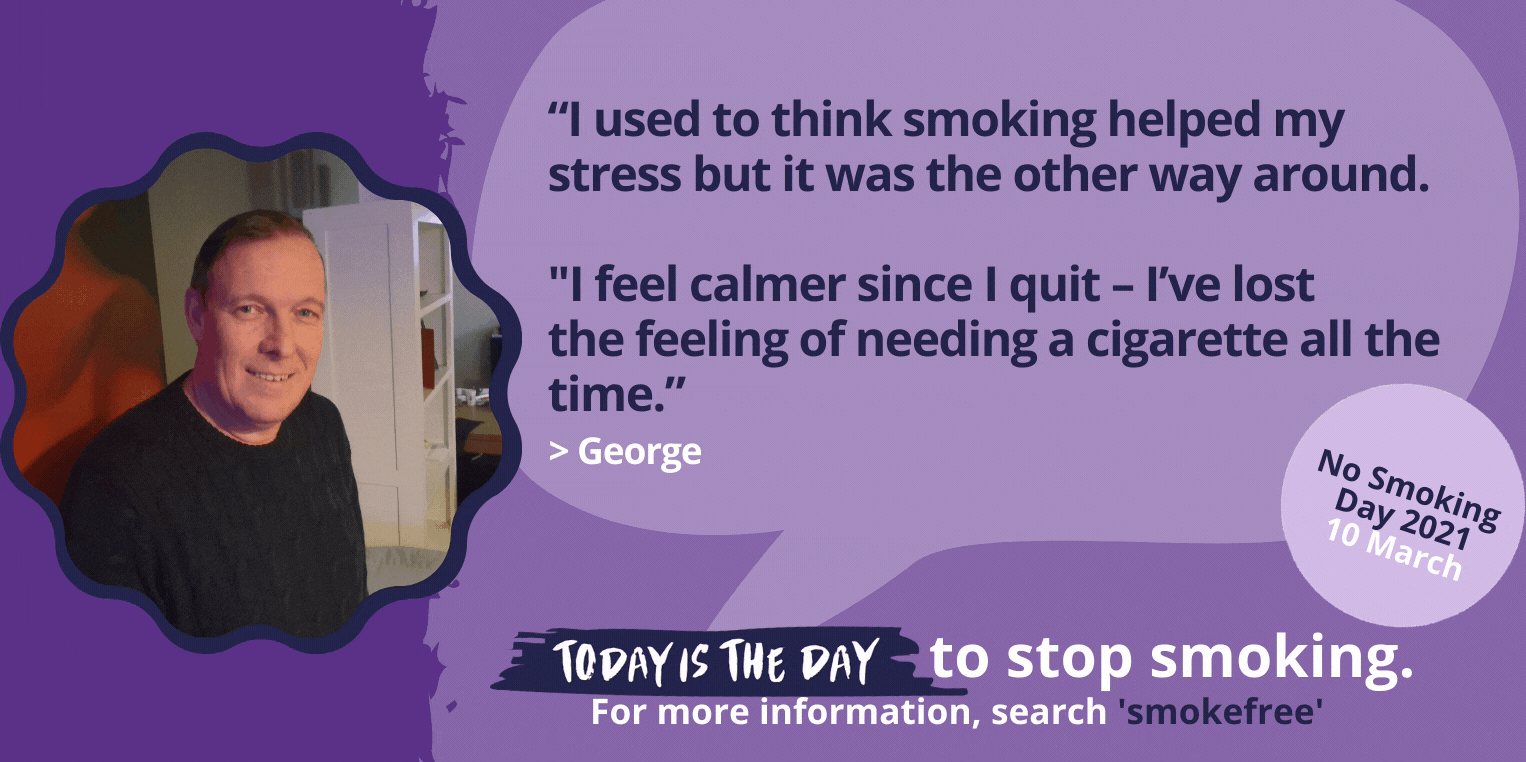No Smoking Day 2021 – quitting can boost mental health in just six weeks
Just six weeks – that’s all it can take for quitting smoking to boost your mood and mental health according to new research published in time for No Smoking Day (Wed 10 March).
As schools go back and people across the region consider a new start, Fresh and a leading North East consultant psychiatrist are calling on smokers to give quitting smoking another go.
It comes as a major review from Cochrane reassures smokers who want to stop smoking that quitting for at least 6 weeks may improve their mental wellbeing, by reducing anxiety, depression, and stress. People’s social relationships are unlikely to suffer if they stop smoking.
The review found that people who stopped for at least 6 weeks experienced less depression, anxiety, and stress than people who continued to smoke. People who quit also experienced more positive feelings and better psychological wellbeing. [1]
Reductions in anxiety and depression in those who quit smoking are found to be at least as great as from taking anti-depressants.
Smoking is clearly not helping smokers to feel better, with Public Health England (PHE) publishing new data showing smokers have poorer mental wellbeing than non-smokers. The PHE / Office National Statistics data found smokers scored worse than the general population on every mental wellbeing indicator in both 2019 and 2020 [2]. In the North East, nearly half (43%) of smokers were found to have high anxiety compared to 38% nationally.
Smoking is the world’s leading cause of preventable illness and death. One in every two people who smoke will die of a smoking-related disease unless they quit.
Saving money can also ease stress – someone smoking 10 a day is likely to be spending around £144 per month on tobacco – which means a saving of around £430 for summer trips out by the time June comes around.
To get started, Search “Smokefree” to find tips, tools and find local stop smoking service support.
Ailsa Rutter OBE, Director of Fresh, said: “This is the clearest evidence yet about the benefits of quitting smoking to relieve stress, anxiety and mental health. People with mental health conditions die 10 to 20 years earlier than the general population, and smoking is the biggest cause of this life expectancy gap.
“Many smokers believe tobacco helps them with stress, but now we know that if you can quit for just six weeks, you can start to see an improvement not just in your physical health but feeling less stressed and anxious. Your best chance is if you get the right quitting aids and support to ease the cravings.”
She added: “As schools go back and homeschooling ends, many parents will be breathing a sigh of relief. If you smoke, quitting can give you a new start and can save you hundreds of pounds by the summer.”
Prof Eilish Gilvarry, Consultant Psychiatrist in Addictions for Cumbria, Northumberland, Tyne and Wear NHS Foundation Trust, said: “We all know stopping smoking improves physical health – but it also improves mood, relieves anxiety and stress, and in the long run you’re calmer and happier.
{video}local|images/videos/NoSmoking_DayEilishGilvarry.mp4|images/videos/Eilishthumb.png|NoSmokingDay{/video}
“It’s a common myth that smoking reduces the anxiety but actually it is the other way around – smoking affects chemicals in the brain so when you’re without a cigarette you get anxious or irritable. You smoke and feel like that relieves the stress, but it’s only very temporary and it is now dependence. You’re now hooked on cigarettes and that will continue to increase your anxiety.
“You might think quitting smoking is stressful but you can take a lot of stress out of it – getting help from your local stop smoking service, using quitting aids and nicotine replacement, or vaping can help, quitting aids are very important and your local stop smoking service can talk you through the options.
“It is important if you’re taking nicotine replacement, you get enough – it is not nicotine causing problems but tobacco. Every day an achievement if you stay off, the longer you stay off the longer you are to quit for good.”
Former North East smoker George Egglestone quit smoking in 2020 after seeing his partner David Reay quit. He is now 5 months smokefree and said: “I used to think smoking helped my stress but now I realise it was the other way round. I used to reach for my pack of cigarettes every time I felt stressed but not now. Since I quit, I definitely feel less stressed and calmer and best of all I have lost the feeling of needing a cigarette all the time. Now I don’t want a cigarette.

“One of the first things I noticed was a massive difference health-wise as I rarely cough now and the wheezing on my chest at night time in bed has disappeared - that was another thing which stressed me and getting rid of that has been terrific.”
The lead author of this Cochrane Review, Dr Gemma Taylor from the Addiction & Mental Health Group at the University of Bath, said: “”Many people who smoke are concerned that quitting could disrupt their social networks, and lead to feelings of loneliness. People can be reassured that stopping smoking does not seem to have a negative impact on social quality of life. People may also be concerned that quitting is stressful. The evidence shows that stress is reduced in people who stop smoking and that there are likely longer-term benefits for peoples’ mental health.”
Deborah Arnott, Chief Executive of Action on Smoking and Health said:”After the year we’ve all had some smokers might not feel it’s the right time to stop but it absolutely is. People trying to quit right now have a greater chance of success and if you use aids like NRT patches and gum, vaping or stop smoking services you will probably find it easier than going alone. Be confident that once you’ve put withdrawal behind you not only will you be healthier and wealthier but happier too.”
Mark Rowland, Chief Executive of Mental Health Foundation said: “There is a mental health crisis emerging from the pandemic and we need to find many new ways of addressing this. Getting people to stop smoking can play a role in getting the mental health of the nation back on track. We’re pleased to be supporting the call for smokers to start their next quit attempt on No Smoking Day.”
[1]https://www.cochranelibrary.com/cdsr/doi/10.1002/14651858.CD013522.pub2/full#CD013522-abs-0002
[2] PHE. Smoking prevalence in adults: current smokers aged over 18 years by wellbeing group and region. March 2021. (Accessed March 2021). Data on smoking and mental wellbeing was captured in the Annual Population Survey in 2019 and the Opinions and Lifestyle Survey in 2020. PHE have advised that the questions and methodology are sufficiently similar to be confident making comparisons between 2019 and 2020
